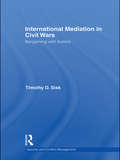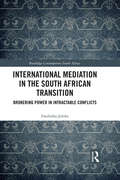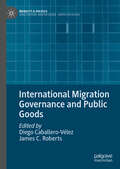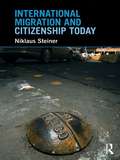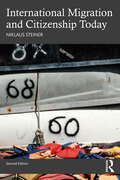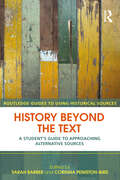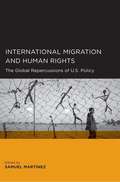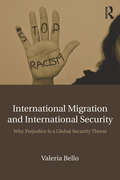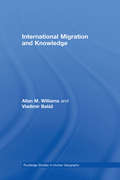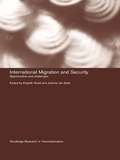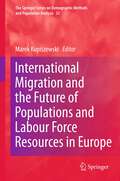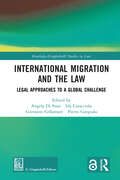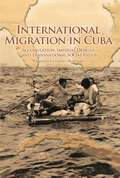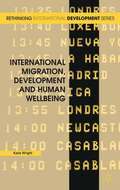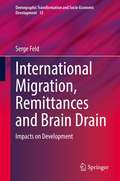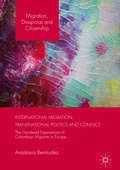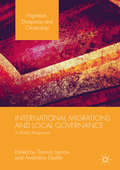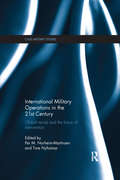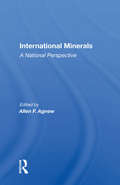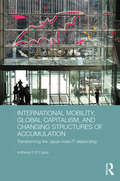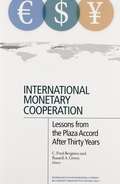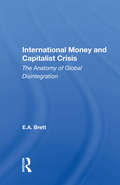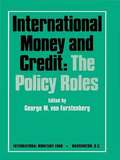- Table View
- List View
International Mediation in Civil Wars: Bargaining with Bullets (Routledge Studies in Security and Conflict Management)
by Timothy D SiskThis book evaluates the role of international mediators in bringing civil wars to an end and makes the case for ‘powerful peacemaking’ – using incentives and sanctions – to leverage parties into peace. As internal violence within countries is a hugely significant threat to international peace in the post-Cold War era, the question of how these wars end has become an urgent research and policy question. This volume explores a critical aspect of peacemaking that has yet to be sufficiently evaluated: the turbulent period beyond the onset of formal or open negotiations to end civil wars and the clinching of an initially sustainable negotiated settlement. The book argues that the transnational flow of weapons, resources, and ideas means that when civil wars today end, they are more likely to do so at the negotiating table than on the battlefield. It uses bargaining theory to develop an analytical framework to evaluate peace processes – moving from stalemate in wars to negotiated settlement – and it rigorously analyses the experiences of five cases of negotiated transitions from war and the role of international mediators: South Africa, Liberia, Burundi, Kashmir, and Sri Lanka.
International Mediation in the South African Transition: Brokering Power in Intractable Conflicts (Routledge Contemporary South Africa)
by Zwelethu JolobeThis book challenges the conventional understanding of South Africa’s transition to democracy as a home-grown process through a comparative analysis of Commonwealth and United Nations mediation attempts. Approaching power transition through the lens of South Africa, Zwelethu Jolobe raises questions about how methods and types of mediation are understood, and their appropriateness for certain stages of negotiation processes. International Mediation in the South African Transition calls into question the generalisations about the determinants of success by international third parties in resolving internal conflicts. It moves from the position that the success of a mediation effort depends on the examination of the time horizon of a conflict and on the contribution the mediation effort plays in improving the relationship between the belligerents. The book argues that the international community, particularly the Commonwealth and the United Nations, played a profound and beneficial role in the political transition to end apartheid. International Mediation in the South African Transition will be of interest to students and scholars of African politics, conflict resolution, international relations and global governance.
International Migration Governance and Public Goods (Mobility & Politics)
by James C. Roberts Diego Caballero-VélezThis edited volume will take an expansive view of the “publicness” of both the policies and the effects related to migration, immigration, and refugees. It will include examinations of international systemic factors and local economic factors. Because migration governance varies geographically, the book will be organized by region. It will include chapters on Africa; Australia; New Zealand and the Pacific Islands; Europe; North America; and SouthAmerica. The book will be focused on how public goods theory provides deep understanding of the factors that affect migration governance and on how understanding the public goods nature of migration governance can help develop effective policies for addressing these problems.
International Migration and Citizenship Today
by Niklaus SteinerInternational migration has emerged in the last decade as one of the world’s most controversial and pressing issues. This thought-provoking textbook offers the reader a more nuanced and knowledgeable understanding of the complex economic, political, cultural, and moral concerns that arise when people move across borders seeking admission into other countries. Splitting the text into five broad sections, Steiner facilitates easy navigation of the complex discussions that surround the issue of migration: Section One – Introduction: examines how the central questions that frame the book will be addressed, including: what criteria should be used to admit migrants? and How should a country grant citizenship? Section Two – Immigrants: discusses the criteria for accepting immigrants, dealing with the unwanted, and assessing the economic, cultural and political impacts. Section Three – Refugees: evaluates the methods used to protect refugees, the controversies surrounding asylum and the shortcomings of current refugee definitions. Section Four – Citizenship: charts the rise of nationalism, presents modern issues of minority rights and diversity, and examines processes of naturalization across the globe. Section Five – Conclusion: considers more unconventional approaches to migration and citizenship, and suggests moving towards a more holistic approach. Carefully constructed to spark discussion and student reflection and featuring suggested resources at the end of each section, this book offers dozens of contemporary examples and case studies from across the globe. International Migration and Citizenship Today is essential reading for not only students of migration and citizenship, but also globalization, international relations, and democracies.
International Migration and Citizenship Today
by Niklaus SteinerThis completely revised and updated textbook explores the moral, economic, political, and cultural dimensions of the movement of people across international borders. In style and substance, it is designed to spark thoughtful discussions and to challenge readers to draw their own conclusions to questions such as how should democracies balance the rights of immigrants with those of citizens? What exactly constitutes persecution and how should we define a refugee? How should democracies allocate citizenship? Can and should a distinction be made between voluntary and forced migration, and does one group of migrants deserve admission more than the other? What does a reasonable border policy look like? The rise of populism, the vote for Brexit, and the unprecedented flow of refugees around the world are all evidence that these questions remain highly salient, controversial, and unresolved. The content has been thoroughly updated to cover: • Migration into Europe since 2015. • Climate change as a driver of migration and the concept of environmental refugees. • Unaccompanied minors fleeing gang violence, asylum for victims of domestic violence, family separation policies, and the building of a wall on the U.S./Mexican border. • The controversies surrounding the Danish cartoons, Charlie Hebdo, and hijabs as examples of the tensions in liberal democracies between free speech, individual freedom, religious expressions, and minority rights. • The Dream Act and Deferred Action for Childhood Arrivals (DACA). • Demographic shifts and the debates around multiculturalism and diversity. • Guest-worker programs as alternatives to admitting immigrants. Intended as the main text for undergraduate classes on international migration, the book will also appeal to broad survey courses on world politics, comparative politics, international relations, global history, and more specialized courses on human rights, citizenship, and nationalism.
International Migration and Globalization of Domestic Politics (Routledge Research in Transnationalism)
by Rey KoslowskiIncreasing international migration, the information revolution and democratization have propelled a globalization of the domestic politics of many states and, although diasporic politics is not new, emigrant political participation in homeland politics has grown as well as adapted to the new methods of the information revolution. This book examines the participation of emigrants in their home country politics. It considers the consequences of such participation for domestic and foreign policies in both host and home country, and explores the theoretical implications for democracy, nationalism, the state and the shape of world politics in the future. It includes detailed case studies of Turkish emigrants in Europe, the US and Saudi Arabia, Kurds in Europe, Israeli emigrants and the American Jewish community, Mexicans in the US, Chinese throughout the Pacific Rim, Indians in the US and Russians who found themselves outside Russia when the Soviet Union collapsed.By providing extensive documentation of emigrant political activity with significant impact on homeland politics and foreign policies, this work provides ammunition to the argument that international migration, globalization and transnational phenomena pose serious challenges to the state and the international system of states. It will be of interest to anthropologists, sociologists and area studies specialists as well as political science and international relations scholars.
International Migration and Human Rights: The Global Repercussions of U.S. Policy
by Samuel MartínezThis book contains essays divided into four sections, each section developing a different angle on the repercussions of U.S. policy for the rights of migrants at different points in history and in various parts of the world.
International Migration and International Security: Why Prejudice Is a Global Security Threat
by Valeria BelloThrough an interdisciplinary analytic lens that combines debates emerged in the fields of international relations, political science and sociology, Valeria Bello reveals how transnational dynamics have increased extremism, prejudiced attitudes towards others and international xenophobia. Bello begins her analysis by tracing similarities between Europe today and Europe before World War II to explain why prejudice is a global security threat and why it is arising as a current global concern within International Organizations. In such a light, Bello shows how changes in the International System and the attack on the UN practice of Intercultural Dialogue have become sources of new perceived threats and the reasons for which new exclusionary patterns have arisen. She argues that both those outcomes have been exacerbating the perceived clash of civilizations and the root causes of different fashions of extremisms. Bello concludes by portraying alternative ways to deal with these instabilities through a partnership of the different stakeholders involved, including both state and non-state actors at global, regional, national and local levels. International Migration and International Security provides a unique crosscutting angle from which to analyze the current socio-political crisis connected to the theme of international migration that the world is currently witnessing. Bello expertly shows that different paths for the world are possible and suggest ways to further promote Global Human Security through local, national, regional and global practices of Intercultural Dialogue.
International Migration and Knowledge (Routledge Studies in Human Geography)
by Allan Williams Vladimir BalážTwo unconnected but important recent academic and policy debates have focussed on the idea of the knowledge-based economy and the economic consequences of increasing international migration. This book challenges pre-conceived views on the debates and argues the need to understand that all migrants are potentially knowledge carriers and learners, and that they play an essential role in the globalization of knowledge transactions. Deconstructing the concept of knowledge, and demonstrating how tacit knowledge is in fact an amalgam of encultured and embrained/embodied forms of knowledge this book considers how international migration has profound consequences, analysed, first, in terms of the economic and immigration strategies of national and regional bodies. And, secondly, the authors explore how the ‘diversity dividend’ of migration is captured by firms through their management strategies, and by individuals through increasingly boundaryless careers, continuous learning and transnational working lives. This research is a highly original contribution which provides the first overview of one of the most dynamic forces for change in the globalising economy. It will challenge migration researchers and students to engage with the management and learning literatures, and it will challenge management and economic policy analysts to think through the role of international migration. As such it will contribute to teaching and research in a range of social science disciplines, as well as to those involved in policy arenas ensuring that firms and all migrants engage in mutual learning and knowledge sharing.
International Migration and Security: Opportunities and Challenges (Routledge Research in Transnationalism)
by Elspeth Guild Joanne Van SelmEvery day newspapers in the Western world carry articles about illegal immigrants, asylum seekers and other migrants. The focus of these articles varies greatly from migrants as a threat to one or another important social or societal interest, to migrants as an important asset to those same interests. The tone is most often emotional - whichever way the focus goes. The overall impact is to confuse: is migration good or bad? In this book Guild and van Selm seek to investigate these value assessments regarding migrants in Europe, the USA, Canada and Australia. While looking at issues such as security, human rights, legal systems, identity, racism, welfare, health and labour, the authors also respond to critics of immigration.
International Migration and the Future of Populations and Labour in Europe
by Marek KupiszewskiThe changes of populations are determined by fertility, mortality and migration. On the national level, international migration is a factor of increasing demographic, economic, social and political importance. This book addresses the debate on the impact of international migration and economic activity on population and labour force resources in future. It presents a study conducted for 27 European countries, looking 50 years ahead (2002-2052). An extended discussion of theories and factors underlying the assumed evolution of the components of change and economic activity is included as well as a detailed analysis of the historical trends. These theoretical and empirical considerations lead to defining scenarios of future mortality, fertility, economic activity and international migration, which have been fed into a projection model, producing various future population dynamics and labour force trajectories. In addition, simulations have been made to estimate the size of replacement migration needed to maintain selected demographic and labour market parameters in the countries of Europe. The results presented in this book allow researchers, governments and policy makers to evaluate to what extent various migration and labour market policies may be instrumental in achieving the desired population and labour size and structures. The secondary purpose of this volume is to reveal the methodology and argumentation lying behind a complex population forecasting and simulation exercise, which is not done frequently, but is critical for the assessment of the forecasts and also valuable from a purely didactic point of view.
International Migration and the Law: Legal Approaches to a Global Challenge (Routledge-Giappichelli Studies in Law)
by Giovanni Cellamare Ida Caracciolo Pietro Gargiulo Angela Di StasiThis book discusses existing and future trends concerning the development of migratory policies between local and global levels, to understand the challenges and gaps in the protection of migrants. The collection explores international migration and its impact on sovereignty, international cooperation, security, and human rights. In particular, it takes into account the composite framework of international and national rules, and the role of judicial and monitoring bodies in protecting the rights of migrants, with the aim of assessing the state of the art, identifying the gaps, and formulating possible remedies. The work of some international organizations such as the UN and its specialized agencies and the European Union is investigated, together with a set of regional practices such as those of Latin America and South-East Asia, and countries, such as Mexico, Georgia, Tunisia, Italy, and the United States. The issues of the fundamental rights of migrants in the European legal order are also addressed, including the emerging scenarios related to recent crises like the one generated by the war in Ukraine. This timely collection will be essential reading for academics, researchers and policy-makers working in the areas of Migration Law, Asylum and Refugee Law, International Law, International Organizations, EU Law, International Human Rights Law, International Humanitarian Law, Comparative Law and Socio-Legal Studies.
International Migration in Cuba: Accumulation, Imperial Designs, and Transnational Social Fields
by Alejandro Portes Margarita Cervantes-RodríguezSince the arrival of the Spanish conquerors at the beginning of the colonial period, Cuba has been hugely influenced by international migration. Between 1791 and 1810, for instance, many French people migrated to Cuba in the wake of the purchase of Louisiana by the United States and turmoil in Saint-Domingue. Between 1847 and 1874, Cuba was the main recipient of Chinese indentured laborers in Latin America. During the nineteenth century as a whole, more Spanish people migrated to Cuba than anywhere else in the Americas, and hundreds of thousands of slaves were taken to the island. The first decades of the twentieth century saw large numbers of immigrants and temporary workers from various societies arrive in Cuba. And since the revolution of 1959, a continuous outflow of Cubans toward many countries has taken place—with lasting consequences.In this book, the most comprehensive study of international migration in Cuba ever undertaken, Margarita Cervantes-Rodríguez aims to elucidate the forces that have shaped international migration and the involvement of the migrants in transnational social fields since the beginning of the colonial period. Drawing on Fernand Braudel’s concept of longue durée, transnational studies, perspectives on power, and other theoretical frameworks, the author places her analysis in a much wider historical and theoretical perspective than has previously been applied to the study of international migration in Cuba, making this a work of substantial interest to social scientists as well as historians.
International Migration, Development and Human Wellbeing
by Katie WrightKatie Wright explores how human wellbeing is constructed and how it 'travels' across spatial boundaries. She draws on empirical research, undertaken with Peruvian migrants based in London and Madrid and their Peru-based relatives and close friends to explore how human wellbeing is constructed and how it 'travels' transnationally.
International Migration, Remittances and Brain Drain: Impacts on Development (Demographic Transformation and Socio-Economic Development #13)
by Serge FeldThis book provides an analysis of theoretical and empirical researches on the effects of remittances and brain drain on the development of less developed countries (LDCs). It analyzes the most recent global, regional and national data as well as the arguments for and against the emigration of highly skilled personnel and remittances, thereby highlighting policies aimed at optimizing the link between migration and development. The book examines in depth the arguments against "brain drain", namely the loss of skilled labor, wasted public investment in higher education, and reduced tax revenues. It also presents the arguments in favor, emphasizing on the transfer of scientific knowledge, the incentive effect of increased education spending, and participation in international networks. It addresses the central issue of emigration of medical personnel from developing countries and its consequences on the population.The book focuses on the effects of remittances on poverty and inequalities. They improve health conditions, raise education levels and empower women. Positive effects include the stabilizing function of remittances and the improvement of external accounts. Other effects are subject to conflicting assessments such as the reduction of labor supply and the "Dutch disease". The focus is on institutions who integrate economic, social and political incentives in order to establish remittances at the heart of development policies.The book provides a reference for students and research centers devoted to development economics, centers for international migration studies, and research units focusing on population, migration, and development.
International Migration, Transnational Politics and Conflict
by Anastasia BermudezThis book makes a timely contribution to debates surrounding transnational political participation, the relationship between diasporas and conflict, and the gendered experiences of migrants. It fills a significant lacuna in research by analysing how migrants relate to and become involved in the politics of their home and host countries, and how transnational political fields emerge and function. The author achieves this by focusing on the little known but instructive case of Colombian migration to Europe, and the connections between these flows and the armed conflict and efforts for peace in Colombia. Shedding light on different types of migration and the rising complexity of international population movements, this innovative work will appeal to students and scholars of migration and diaspora studies, gender, political participation, conflict and peace studies and Latin American studies. It will also interest policy makers and community development workers engaged in these areas.
International Migrations and Local Governance
by Thomas Lacroix Amandine DesilleThis volume provides a comprehensive overview of the role of local governments around the world in the management of the migration, integration and development nexus. Drawing on case studies from the Global North and South, this comparative work fills a lacuna in the existing literature which has focused largely on migration as addressed by European and North American cities. Further, it widens the current debate by confronting northern experiences with attitudes and strategies observed in sending countries; clearly demonstrating that international mobility has become a global issue for cities at both end of the migration spectrum. This innovative work will provide a valuable resource for students and scholars working in the social sciences, public policy and development; in addition to practitioners and policymakers.
International Military Operations in the 21st Century: Global Trends and the Future of Intervention (Cass Military Studies)
by Per M. Norheim-Martinsen Tore NyhamarThis book examines the challenges that military forces will face in multinational operations in the 21st century. Expanding on Rupert Smith’s The Utility of Force, the volume assesses the changing parameters within which force as a political instrument is ultimately carried out. By analysing nine carefully selected mission types, the volume presents a comprehensive analysis of key trends and trajectories. Building upon this analysis, the contributors break the trends and parameters down into real and potential tasks and mission types in order to identify concrete implications for military forces in future multinational operations. The context of military intervention in conflicts and crises around the world is rapidly evolving. Western powers’ shrinking ability and desire to intervene makes it pertinent to analyse how the cost of operations can be reduced and, how they can be executed more intelligently in the future. New challenges to international military operations are arising and this book addresses these challenges by focusing on three key areas of change: 1) An increasingly urbanised world; 2) The changing nature of missions; 3) The commercial availability of new technologies. In answering these questions and embracing some of the insights of a growing field of future studies, the volume presents an innovative perspective on future international military operations. This book will be of much interest to students of international intervention, military and strategic studies, war and conflict studies, security studies and IR in general.
International Minerals: A National Perspective
by Allen F AgnewThe United States depends on foreign sources for many strategic and essential minerals. Secure supplies of such minerals are crucial to the nation's economic and military well-being, but federal policies with regard to these minerals have continued to vacillate. This volume considers the minerals availability issue from a number of perspectives. In
International Mobility, Global Capitalism, and Changing Structures of Accumulation: Transforming the Japan-India IT Relationship (Routledge Advances in International Political Economy)
by Anthony P. D'CostaInternational mobility is not a new concept as people have moved throughout history, voluntarily and forcibly, for personal, familial, economic, political, and professional reasons. Yet, the mobility of technical talent in the global economy is relatively new, largely voluntary, structurally determined by market forces, and influenced by immigration policies. With over a decade's worth of extensive research in India, Japan, Finland, and Singapore, this book provides an alternative understanding of how capitalism functions at the global level by specifically analyzing the international movement of technical professionals between India and Japan. There are three factors that inform this study: the services transition away from manufacturing, the movement of technical professionals in the world economy, and the demographic crisis facing Japan. The dynamics of changing capitalism are examined by theorizing the emergence of the services sector in the USA and Japan, analyzing the pronounced social inequality in India that is the basis for the global supply of highly skilled technical professionals, and providing considerable empirical data on the flows of professionals to these two countries to indicate Japan's institutional inflexibility in accommodating foreign talent. The author anticipates that Japanese industry will shed some of its institutional rigidity due to the pressures of competition and the scarcity of technical professionals. Providing a wealth of information on the topic of international mobility, this book is an essential addition for scholars and students in the field of International Development, Business Studies, Asian Studies, Migration Studies, and Political Economy.
International Monetary Cooperation
by C. Fred Bergsten Russell A. GreenInternational Monetary Cooperation: Lessons from the Plaza Accord after Thirty Years, Global Currency Rules, Exchange Rate Stabilization, Exchange Rates, Policy Coordination, currency policy, 1985 Plaza Accord, Plaza Accord, finance ministers, Gerhard Stoltenberg, Pierre Beregovoy, Nigel Lawson, Noboru Takeshita, Charles H. Dallara, Makoto Utsumi, 978-0-88132-711-3, 978-0-88132-712-0, Peterson Institute for International Economics, C. Fred Bergsten, Russell A. Green, James A. Baker, III, David C. Mulford, Jeffrey Frankel, Takatoshi Ito, David H. Papell, Ruxandra Prodan, Edwin M. Truman, Barry Eichengreen, Joseph E. Gagnon, John B. Taylor, Agnès Bénassy-Quéré
International Monetary Cooperation: Lessons from the Plaza Accord after Thirty Years
by C. Fred Bergsten Russell A. GreenIn September 1985, emissaries of the world's five leading industrial nations—the United States, Britain, France, Germany, and Japan—secretly gathered at the Plaza Hotel in New York City and unveiled an unprecedented effort to correct the largest set of current account and exchange rate imbalances that had ever threatened the world economy. The Plaza Accord is credited with sharply realigning exchange rates, significantly reducing current account imbalances, and countering protectionist pressures in the United States. But did the Accord provide a foundation for ongoing international financial stability and policy coordination? Or was it simply a unique one-time coincidence of national interests?The Plaza experience continues to inform today's debates about the limits and possibilities of international monetary cooperation. In late 2015, leading policymakers and economists—including those who were involved in the Accord's design, negotiation, and implementation—held a Plaza Retrospective conference at the Baker Institute for Public Policy to evaluate the Accord's legacy and how its collaborative spirit can be applied today. This volume presents their views and analyses to provide guidance for a time when the world again faces the prospect of currency disequilibria, growing imbalances, trade policy reactions, and thus uncertainty for both the global economy and world politics.Data disclosure: The data underlying the analysis in this volume are available. The data used in chapter 14 are taken directly from William Cline's Policy Briefs 15-8 and 15-20, with the exception that they have been manipulated with a key assumption stated in the chapter.
International Monetary Fund Handbook
by Bernhard Fritz-Krockow Parmeshwar RamloganA report from the International Monetary Fund.
International Money And Capitalist Crisis: The Anatomy Of Global Disintegration
by E. A. BrettIn attempting to understand the growing importance of the monetary problem for deficit countries, the author found himself drawn into more and more abstract and general problems of economic theory and institutional change. The post-war period has completed the internationalisation of capitalism: production at any point depends directly upon a mult
International Money and Credit: The Policy Roles
by George M. von FurstenbergA report from the International Monetary Fund.
